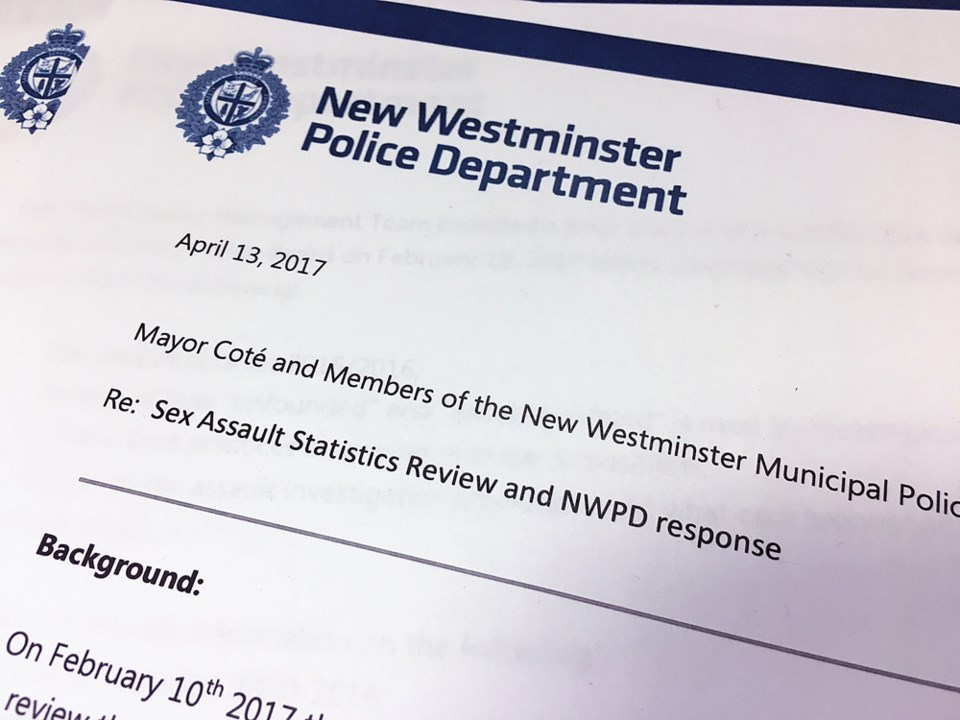The rate of reported assaults and sexual assaults determined by New Westminster police to be “unfounded” increased between 2018 and the first nine months of 2019, despite a nationwide policy change on how police complaints are classified.
Asked about data from a police board meeting, which showed a higher number of assaults in 2019 over 2018, the New Westminster Police Department said the increase was likely due to the change in how police forces determine which cases are “founded” and “unfounded” – police classifications for whether or not a crime is believed to have occurred.
Until Dec. 31, 2018, police needed to show reasonable grounds that a crime occurred on the date, time and location it was reported to be considered founded. But as of Jan. 1, 2019, a complaint is considered founded by default unless an investigation shows otherwise.
Theoretically, that should translate into an increase in founded files, which would show an apparent bump in crimes, as crime-rate statistics focus on founded complaints.
The Record asked NWPD communications staff in October for the data on how many claims were classified as founded/unfounded for 2019 and 2018 to gauge the effect of the policy change.
However, more than a month later, the request was denied, because comparing 2018 and 2019 unfounded data would be “invalid” due to the policy change, according to Sgt. Jeff Scott, who directed the Record to the freedom-of-information process to obtain those stats.
The Record recently obtained, through an FOI request, data for January to September 2019 for assaults and sexual assaults to compare with Statistics Canada data for 2017 and 2018.
The data show the rate of unfounded claims of both assault and sexual assault actually increased in the first nine months of 2019, and the rate of overall claims of both also significantly increased.
Between January and September 2019, 389 claims of assault and 59 claims of sexual assault were made to the NWPD. That includes 45 assault claims (11.57%) classified as unfounded and nine sex assault claims (15.25%) classified as such.
By comparison, 441 claims of assault and 29 claims of sexual assault were made in all of 2018, according to StatsCan data. That includes 45 unfounded assault claims (10.2%) and four sex assault claims (13.79%) classified as unfounded.
Asked for comment on the increases in unfounded rates among sexual assault and assault claims, Scott repeatedly insisted the comparison between 2018 and 2019 was not valid because of the policy change.
“We can’t accurately compare these two numbers, but according to Stats Canada there was an anticipated decline in these numbers after the change,” Scott said in an email.
“So, why the supposed increase in unfounded rates for sexual assaults in 2018 to 2019 when the expectation was that it would decrease? We already can’t compare 2018 to 2019, but there were expected outcomes. There are variables that affected the anticipated outcomes.”
Among the variables, Scott noted the creation of the NWPD’s special investigations unit, which was created in January 2018 to “build bridges and remove barriers that victims may experience,” including dedicating a full-time detective to work with victim support workers.
“Furthermore, the #metoo movement encourages people to come forward and helps remove the associated stigma. Therefore, the expected outcomes after the change to reporting was affected,” Scott said.
“But again, statistics between 2018 and 2019 cannot be accurately compared and we cannot make reasonable deductions from the dataset.”
While the 2019 unfounded rate increased compared with 2018, the unfounded rate for sexual assaults remained well below the rate in 2017 and the period between 2010 and 2014, for which data was made available through a Globe and Mail investigation.
StatsCan began compiling the data in 2017, following the Globe investigation, which found one in five sexual assaults nationwide were dismissed as “unfounded.” The Globe published unfounded data from hundreds of police forces throughout the country from 2010 to 2014, including the NWPD.
Comparing the various data, the first nine months of 2019 showed the highest rate of unfounded claims of assaults among the eight years of available data (no data are available for 2015-16), despite the policy change. There was also a higher rate of claims, including founded and unfounded, in 2019 (43.22/month) compared with any other year. The second-highest rate was in 2010, with 38.67 claims per month.
For sexual assaults the first three quarters of 2019 had the third-lowest unfounded rate, with 2011-14 and 2017 all seeing rates between 21% and 33%. However, last year also had a far higher rate of sex assault claims than any other year, at 6.56 claims per month. The second highest rate came in 2017, at 4.42/month.



